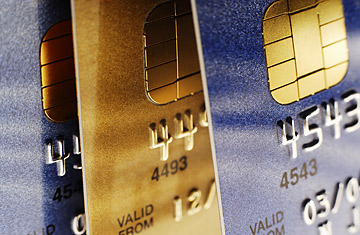
We're not nearly out from under the subprime mortgage meltdown and already analysts are speculating about the next industry crisis, related to the little plastic cards in your wallet. With American Express becoming a bank-holding company this week in order to get low-cost funds and share in the $700 billion bailout pool, it's clear that even traditionally resilient industries like credit cards are feeling pressured. "Credit cards are in line to fall," says Adam Levitin, associate law professor at Georgetown University. "The question is whether they will beat out the auto industry — they're racing for the honors."
The net charge-off rate on credit-card defaults could skyrocket to 10% in 2009 — double the average of 5% over the past 10 years — reaching $18.6 billion in the first quarter and $96 billion by the end of next year, predicts an October report from Innovest Strategic Value Advisors, an investment-research firm. "A 10% [charge-off] rate would be unprecedented," says Laura Nishikawa, an Innovest analyst. (Read "Fannie and Freddie Offer New Plan to Help Homeowners.")
Traditionally, the credit-card industry is resilient during economic downturns because of its pricing flexibility. As the economy slows and people start to become late on their payments, card companies can boost earnings through late fees and higher interest rates. Today, however, consumers are tapped out and defaults are ratcheting up. "With charge-offs rising so fast and beyond what was expected, the losses those cause will far surpass what companies were hoping to make up with by extra card fees and higher interest rates," says Nishikawa. Nonetheless, the industry keeps trying: on Thursday, embattled Citigroup announced that, in addition to 10,000 layoffs, it would impose higher interest rates on some of its 54 million cardholder accounts. Citigroup's credit-card division lost $902 million in the third quarter.
As with the auto industry in Detroit, some of the credit-card industry's current problems have been years in the making. Over the past decade, U.S. households have been loading up on debt, with credit-card balances rising 75% since 1999. Yet families' real wages have increased only slightly — by just 4% during that same time period, according to Innovest. The savings rate has similarly declined relative to credit-card balances. Meanwhile, home equity, the biggest source of wealth for most families, has been drained by the mortgage crisis. "There isn't a cushion for anyone who has a bump in the road," says Levitin. "Credit cards are often the first place where we start to see all the other problems show up, from medical bills to divorce to a death in the family." And then, of course, there's unemployment. Thus, it's not surprising that credit defaults are up dramatically, at the highest rate in six years.
Increased use of securitization in the credit-card industry has fueled some if its growth. Over the past four years, seven of the biggest card issuers packaged more debt into securities, which they sold to investors, according to USA Today's assessment of banking records. But with credit-card defaults rising and a general "flight to quality" this year brought on by the subprime mortgage crisis, fewer outlets are willing to buy the debt. "The securitization market for credit cards was operating for the first half of 2008 but is now shut down, making it harder to securitize credit-card debt," says Arthur Wilmarth, finance professor at George Washington University Law School. Banks, forced to keep more debt on their books, are less willing to lend to anyone who doesn't have a high FICA, or credit quality, score. The result is a vicious cycle of borrowers being hit with higher interest rates, hair-trigger late fees and curtailed credit lines just when they need funds the most. Higher food and gas prices have contributed to that burden.
Still, not everyone agrees that the situation is on the brink of despair. "The credit-card industry is being likened to what has happened in the mortgage industry," says Greg McBride, senior financial analyst at Bankrate.com, a personal-finance website. "I don't see how the two should be mentioned in the same sentence." He reasons that even if credit-card defaults reach a record high of 10% of the $970 billion in revolving debt, a chunk of that total will get paid off in full every month, which would result in an aggregate default of less than $100 billion. That number doesn't come near the losses that have occurred in the $14 trillion U.S. mortgage market. Moreover, credit card asset-backed securities aren't as far-reaching or as complex as mortgage asset-backed securities, and they don't have large amounts of credit-default swaps piled on top of them like mortgages do. As a result, a total collapse of the credit-card industry wouldn't have the same far-reaching ramifications.
"I don't think the credit-card industry will implode," says Ronald Mann of Columbia Law. Issuers have been taking steps to mitigate risks like scaling back credit lines and closing out accounts for cardholders exhibiting distress. "Sure, they're likely to have a bad year," he says, "but lots of people will in 2009."
